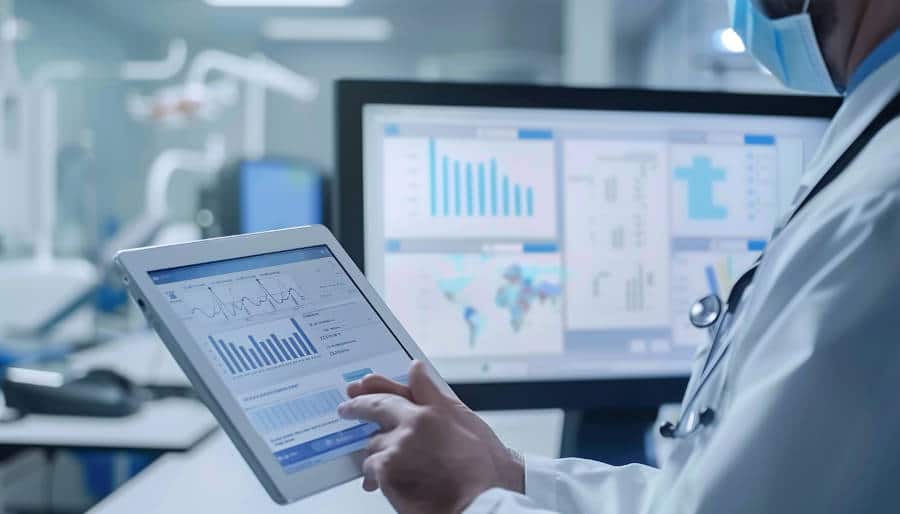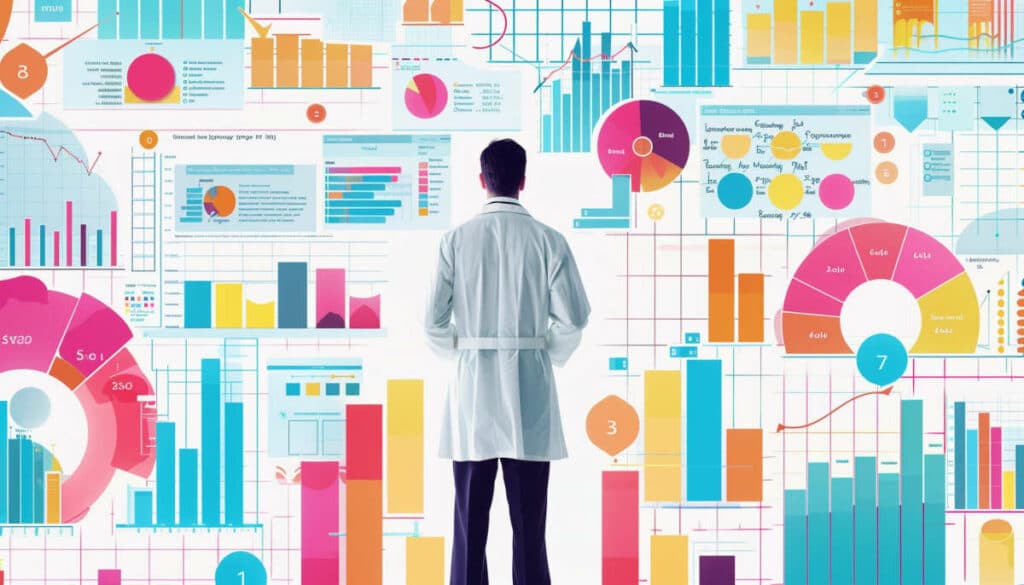Healthcare Data Analytics is the analysis of health data produced by the medical sector, driving substantial improvements in care and clinical outcomes. Learn everything you need to know about this groundbreaking field: types of data, analysis methods, concrete applications... here’s how Data Science is transforming the modern medical landscape!
Since the dawn of time, humanity has endeavored to enhance health and stretch the boundaries of medicine. From the herbalists of ancient civilizations to contemporary scientific discoveries, the objective has always been consistent.
The focus is on understanding diseases, discovering effective treatments, and delivering care that prolongs and enhances human life. Every advancement, whether stemming from empirical observation or experimental methods, has contributed to the development and expansion of a vast body of medical knowledge. Now, in the digital age, a new frontier is emerging: data. The plethora of data generated by modern health equipment, personal tracking technologies, and clinical trials provides an immensely valuable source of information.
When properly collected, analyzed, and interpreted, these data can revolutionize the way we diagnose diseases, administer treatments, and manage healthcare systems on a global scale. This approach represents a key to unlocking the hidden potential of medical data by merging the capabilities of computing, statistics, and artificial intelligence: this is Healthcare Data Analytics.
What is health data?
With the advent of computer and digital technologies, the healthcare sector has begun generating a wide array of data.
Firstly, clinical data includes Electronic Health Records (EHRs), which encompass detailed information about patients’ medical history, diagnoses, treatments, and laboratory and imaging test results. These data are essential for monitoring patients’ health progress and evaluating the effectiveness of medical interventions, making them central to Healthcare Data Analytics.

Often underappreciated, administrative data are also highly valuable for optimizing hospital operations. This data includes billing information, diagnostic and treatment codes, and patient admissions and discharge data. Analyzing these helps to identify trends and inefficiencies in administrative processes, facilitating better resource allocation and cost reduction.
With the rise of mobile technologies and health tracking devices such as smartwatches, patients themselves are increasingly generating data. Health applications on smartphones, smartwatches, and other wearable devices collect real-time data on parameters such as heart rate, physical activity levels, and sleep patterns.
All these data provide insights into daily health and enable continuous monitoring, allowing for timely interventions when necessary. Additionally, clinical trials generate a wealth of data that is extremely valuable for medical research. The results of trials, observed side effects, and other detailed information can be utilized.
By analyzing these data, researchers can ascertain the efficacy and safety of new treatments and medications, thereby expediting the development of novel therapies. Thus, Healthcare Data Analytics enables healthcare professionals to enhance care quality and make the healthcare system more efficient and patient-centered. But how do we accomplish this?
Different methods of analysis
The analysis of health data employs various methods and techniques to extract relevant information from collected data.
The starting point for exploring these data is often descriptive analysis. This involves using descriptive statistics like the mean, median, and standard deviation, alongside visualization techniques such as graphs and tables. These tools help to understand the basic characteristics of the data, identify trends and patterns, and summarize information for easy interpretation.
On the other hand, diagnostic analysis aims to uncover the underlying causes of health events or clinical outcomes. Advanced statistical techniques are employed to determine factors contributing to certain medical conditions or specific outcomes. For instance, the goal might be to study the risk factors associated with a particular disease or assess the impact of medical interventions on patient health.
To forecast future events or health outcomes, one can utilize predictive analysis. This method uses statistical models and Machine Learning algorithms to predict future events or health outcomes. The idea is to analyze historical data to identify trends and patterns that can be used to anticipate patient needs, foresee medical complications, or optimize treatments. These predictive models could be used, for example, to predict the risk of hospital readmission or recommend personalized adjustments in treatment plans.

Beyond prediction, prescriptive analysis offers data-driven recommendations to enhance health outcomes.
It employs advanced methods such as mathematical optimization and simulations to determine the best actions to take based on specific patient conditions and clinical constraints. This might involve suggesting adjustments in medication dosages or chronic disease management strategies to optimize therapeutic outcomes.
What is it for?
Practical applications of Healthcare Data Analytics are myriad and diverse. Firstly, it enables the improvement of care quality. By identifying inefficient clinical practices and enhancing adherence to care protocols, medical errors can be significantly reduced.
Moreover, data analysis supports the personalization of treatments by tailoring care plans to individual patient needs. This enhances clinical outcomes. For patients with chronic diseases such as diabetes or hypertension, data analysis facilitates the continuous monitoring of health parameters.
This encourages the early detection of fluctuations, allowing for prompt interventions to prevent complications. Thus, it is an invaluable tool in battling such diseases. Furthermore, by analyzing administrative and operational data, hospitals can optimize resource management.
This optimization helps reduce patient waiting times and improve the efficiency of logistical processes such as medication stock management and bed rotation planning. Lastly, in medical research, data analysis assists in identifying emerging trends by providing a deeper understanding of clinical trials. This sets the stage for new discoveries and innovations in the development of new treatments and therapies through collaborative efforts!
The challenges that remain to be addressed
Despite the numerous benefits, Healthcare Data Analytics also presents significant challenges that must be addressed to ensure its effectiveness and future security.
Firstly, the protection of personal health information is a major concern. Health data are often sensitive, and compromising this information can have severe consequences for patients.
To prevent cyberattacks and unauthorized access, robust information security measures must be implemented. Compliance with regulations such as GDPR in the EU and HIPAA in the United States is essential. Additionally, the accuracy and reliability of health data are critical. Without these attributes, analyses cannot be accurate. The challenge lies in data normalization from diverse sources, managing errors and inconsistencies, and ensuring the completeness of records. Significant effort must be made throughout the analysis process to enhance data quality and maintain its integrity.

Furthermore, Healthcare Data Analytics necessitates advanced technologies and a robust infrastructure. This ensures the efficient and secure storage, management, and analysis of large volumes of data. Beyond technical considerations, the use of health data raises important ethical questions.
How can we ensure equity in access to care? How can we utilize patient data ethically? These are pressing questions for professionals in the field. It is also crucial to minimize potential biases in analysis algorithms and ensure clinical decisions are not influenced by inappropriate factors.
Conclusion: Healthcare Data Analytics, the key to strengthening healthcare systems
y presenting significant opportunities to enhance patient care, optimize hospital operations, and promote medical innovation, Healthcare Data Analytics signifies a true revolution in the healthcare sector.
However, to fully harness its potential, it is critical to address challenges related to data security, technological infrastructure, and ethical considerations. To become an expert in health data analysis, consider choosing DataScientest. Our online training courses provide you with all the essential skills for careers in Data Science.
You will learn to collect, transform, analyze data, and present it through relevant visualizations. We offer training in handling all the tools and techniques used by Data Analysts, Data Scientists, and Data Engineers. Our programs are conducted in BootCamp, continuous training, or work-study formats, leading to a state-recognized diploma and a professional certification. Our organization is also CPF eligible for funding. Discover DataScientest!
You now know everything about Healthcare Data Analytics. For more information on the same topic, check out our comprehensive article on data analysis and our guide on the Data Analyst profession!










